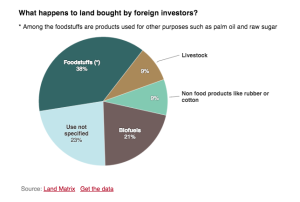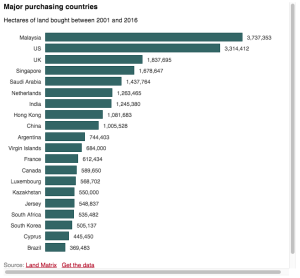Defining The Disruptive Geopolitics Of The Global Farms Race
October 18th, 2016
Via SwissInfo, a look at the worldwide race to own fertile agricultural land:
The worrying rise in foreign investors buying up land in poor countries is set to get worse in future, taking valuable resources from local populations. A report out later this month by a Bern database into ‘land grabbing’ should dig deeper into the problem.
“The grabbing of agricultural land is really a kind of neo-colonialism,” says Swiss entomologist and agriculturist Hans Rudolf Herren, who has been awarded international prizes such as the World Food Prize for his work to stop famine in Africa.
“Wealthy states are getting hold of more and more valuable land in the poor countries, and in two-thirds of these countries, the local population suffers from hunger.”
Herren has for years been one of the international agricultural experts denouncing the new phenomenon of ‘land grabbing’. “These lands are generally put to use for agriculture on an industrial scale, for cultivation of products that are not even intended for the local market. Most of them are exported and are used to produce things like bio-fuel, animal fodder, and processed foods,” he explains.
Land grabbing has been monitored at an international level since 2012 by the online database Land Matrix, created and managed by the Centre for development and environment (CDE) at the University of Bern, along with four other European research institutes. This project was a response to the growth of land grabbing in recent years and has as its aim to help governments, local communities, development aid organisations and researchers to work for greater transparency and responsibility as regards the buying and selling of land.
“This phenomenon has always existed, and went on even after the end of colonialism. It got bigger about ten years ago due to the rising prices of foodstuffs and the growing production of bio-fuels. The crisis in the financial markets since 2007 has encouraged a greater number of investors to get interested in land and agricultural products,” saysMarkus Giger, a researcher at the Bern centre.
The Land Matrix database is coordinated by the Centre for development and environment at the University of Bern, the CIRAD Agricultural Research for Development Centre in Paris, the German Institute of Global and Area Studies in Hamburg, the GIZ society for international cooperation in Bonn and the International Land Coalition (ILC) in Rome.
In the past few years, the trend has been slowed somewhat by the fall in the prices of foodstuffs and petroleum. At the same time, plans to produce bio-fuels have been shelved, often due to criticism at an international level. All the same, the rush to fertile land is only likely to increase in future. Gloabl population growth and rising standards of living in emerging countries are increasing food needs, while reserves of water and land are dwindling.
Lack of land rights
Land Matrix, which will publish a new report at the end of October, has tracked purchases of 27 million hectares of agricultural land concluded by international investors since 2000. If one takes into account land destined for other purposes – resource extraction, production of timber, industry, tourism, etc. – the area rises to 43 million hectares. The database registers only large sales of over 200 hectares, and many transactions remain undetected.
Three-quarters of the 20 states most affected by land grabbing are in Africa and Asia and among the poorest in the world, and in these countries the rights of the population have scant protection. “Purchases are definitely easier in countries with poor governance, weak institutions and lack of land rights. Here the authorities can better impose their will, and in some cases, like Cambodia, even force the local population to move elsewhere,” explains Giger.
The burden is largely borne by peasant farmers. “Most of the buying and selling does not involve land in sparsely populated or uncultivated areas. The purchases are mostly made in accessible regions, where there is more fertile land and means of irrigation. This can mean that peasants are deprived of cultivable land and of the very means of subsistence.”
Not only financial interests of oligarchies are driving countries in Africa and other regions of the world to cede their territory to foreign investors. “These countries are faced with problems to do with poverty and development. They are looking around for ways to generate economic growth, and land often is the only thing they have to sell – and land usually belongs to the government,” explains Giger.
Many governments in developing countries also believe that their agriculture needs to be modernised with new technologies, even if this means more pesticides and chemical fertilisers or genetically modified seed. They hope that investment in agriculture will enable them to develop infrastructure and increase trade and jobs.
Giger concedes that purchases of land by foreign investors may also bring positive results. “But we need to think about what kind of agriculture is needed and be sure that investment is being made in a socially and environmentally responsible way”.
Investment lacking transparency
In 2012 the UN Food and Agriculture Organisation (FAO) put out a set of international guidelines to regulate land purchases in accordance with the rights of native populations and environmental care. These guidelines are not binding, and it is still not easy to determine if they have induced governments and investors to take more responsibility. In this regard, the importance of data gathering by Land Matrix is apparent, for it casts light on the extent of land grabbing and the people involved in it.
The database shows that the most frequent countries of origin of buyers are Malaysia, the US, Britain, Singapore and Saudi-Arabia. China, often linked to land grabbing, is in ninth position. Land Matrix has found few cases of purchases by Swiss companies. Switzerland has its own role in the process, however.
“Switzerland is a major financial player, with hundreds of billions of francs managed by banks but also other institutions like pension funds or the old age security system. It is likely that a large chunk of this money has been placed with investment funds involved with natural resources, agricultural products and land. There is very little transparency about these funds, and it is hard even for us to see the links,” says Giger.
This entry was posted on Tuesday, October 18th, 2016 at 9:22 am and is filed under Uncategorized. You can follow any responses to this entry through the RSS 2.0 feed. You can leave a response, or trackback from your own site.
Leave a Reply
You must be logged in to post a comment.
Educated at Yale University (Bachelor of Arts - History) and Harvard (Master in Public Policy - International Development), Monty Simus has long held a keen interest in natural resource policy and the geopolitical implications of anticipated stresses in the areas of freshwater scarcity, biodiversity reserves & parks, and farm land. Monty has lived, worked, and traveled in more than forty countries spanning Africa, China, western Europe, the Middle East, South America, and Southeast & Central Asia, and his personal interests comprise economic development, policy, investment, technology, natural resources, and the environment, with a particular focus on globalization’s impact upon these subject areas. Monty writes about freshwater scarcity issues at www.waterpolitics.com and frontier investment markets at www.wildcatsandblacksheep.com.

